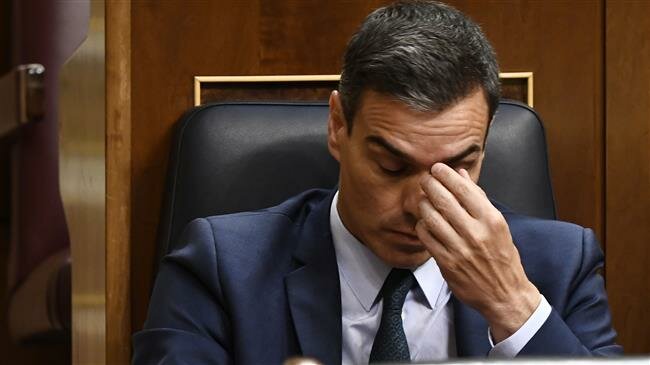Spain: Acting premier admits defeat in confidence vote after failure of coalition talks
Spain’s caretaker Prime Minister Pedro Sanchez has admitted defeat in his bid to be confirmed as the country’s premier after he failed to draw enough support to secure a post-election parliamentary vote of confidence.
“I am very sorry to note that parliament remains blocked,” the socialist premier said during a speech he delivered at the lower house on Thursday, noting that a deal for a coalition government with the far-left Unidas Podemos party had “not been possible.”
The development came a day after talks between the Spanish Socialists and far-left Unidas Podemos, an electoral alliance, on supporting Sanchez broke off. The alliance has been formed by Podemos, United Left, Equo and other left-wing parties.
Sanchez also lambasted the way Podemos and its leader Pablo Iglesias had conducted the talks.
“A deal wasn’t possible,” Sanchez further told legislators, adding, “I want to be Spain’s prime minister, but not at any cost.”
The caretaker premier, whose Socialist party secured the most seats in an April election but failed to achieve a majority, needed Podemos’ backing to win the vote, which means Spain moves a step closer to holding its fourth such elections in as many years.
Now, Sanchez will have another two months to find ways of gaining support, either for a minority or coalition government. If no deal is signed, Spain will have to go back to the polls on November 10.
Additionally on Thursday, Deputy Prime Minister Carmen Calvo, who led the socialist’s negotiation, said Podemos’s demands for government posts were “unrealistic”, accusing the far-left party of wanting “a parallel government” of its own.
Earlier this month, the Socialists announced that they would give up trying to install Sanchez if he failed to secure the July parliamentary vote.
Three months of often acrimonious negotiations between the two parties suggest that, even if there eventually was any coalition government, it could be vulnerable to similar rifts.
Sanchez assumed power in June last year after ousting conservative prime minister Mariano Rajoy in a no-confidence vote over allegations of a corruption scandal.
Catalan pro-independence MPs in the parliament, for their part, refused to give Sanchez the support he needed to pass the 2019 budget bill in February due to the anger at the trial of their leaders in Madrid.
The April elections took place amid Catalonia’s continued push for independence from Madrid.
The region in northeastern Spain was the scene of a secession attempt in 2017 that sparked the country’s biggest crisis in decades and caused major concern in Europe. Since then, the crisis has continued to cast a pall over Spanish politics.
Source: Presstv







